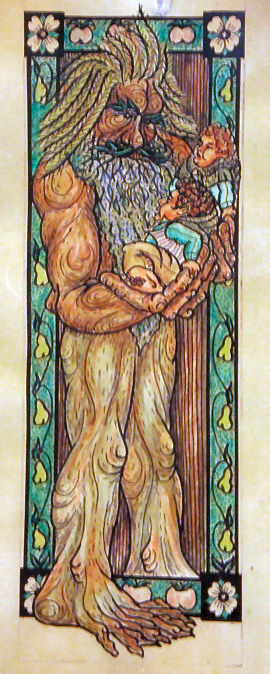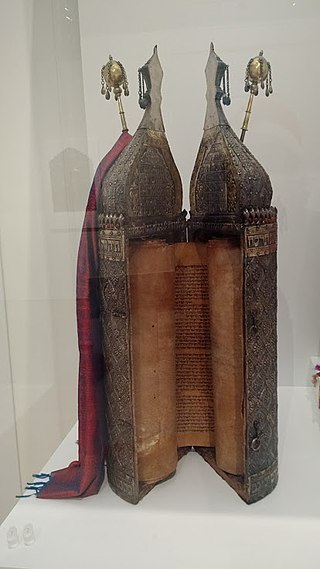Related Research Articles

The Geats, sometimes called Goths, were a large North Germanic tribe who inhabited Götaland in modern southern Sweden from antiquity until the late Middle Ages. They are one of the progenitor groups of modern Swedes, along with Swedes and Gutes. The name of the Geats also lives on in the Swedish provinces of Västergötland and Östergötland, the Western and Eastern lands of the Geats, and in many other toponyms.

Götaland is one of three lands of Sweden and comprises ten provinces. Geographically it is located in the south of Sweden, bounded to the north by Svealand, with the deep woods of Tiveden, Tylöskog and Kolmården marking the border.
Finnish mythology is a commonly applied description of the folklore of Finnish paganism, of which a modern revival is practiced by a small percentage of the Finnish people. It has many features shared with Estonian and other Finnic mythologies, but also shares some similarities with neighbouring Baltic, Slavic and, to a lesser extent, Norse mythologies.

The Farewell Sermon also known as Muhammad's Final Sermon or the Last Sermon, is a religious speech, delivered by the Islamic prophet Muhammad on Friday the 9th of Dhu al-Hijjah, 10 AH in the Uranah valley of Mount Arafat, during the Islamic pilgrimage of Hajj. Muhammad al-Bukhari refers to the sermon and quotes part of it in his Sahih al-Bukhari. Part of it is also present in Sahih Muslim and Sunan Abu Dawood. Verse 5:3, "Today I have perfected for you your religion ...", is believed to have been recited during the address as the capstone verse of the Quran. Various versions of the sermon have been published, including several English translations. The sermon consists of a series of general exhortations for Muslims to follow the teachings that Muhammad had set forth in the Quran and sunnah.
Yaqui, locally known as Yoeme or Yoem Noki, is a Native American language of the Uto-Aztecan family. It is spoken by about 20,000 Yaqui people, in the Mexican state of Sonora and across the border in Arizona in the United States. It is partially intelligible with the Mayo language, also spoken in Sonora, and together they are called Cahitan languages.

The Gutes were a North Germanic tribe inhabiting the island of Gotland. The ethnonym is related to that of the Goths (Gutans), and both names were originally Proto-Germanic *Gutaniz. Their language is called Gutnish (gutniska). They are one of the progenitor groups of modern Swedes, along with historical Swedes and Geats.

Three Men on the Bummel is a humorous novel by Jerome K. Jerome. It was published in 1900, eleven years after his most famous work, Three Men in a Boat .

The Scandinavian Peninsula became ice-free around the end of the last ice age. The Nordic Stone Age begins at that time, with the Upper Paleolithic Ahrensburg culture, giving way to the Mesolithic hunter-gatherers by the 7th millennium BC. The Neolithic stage is marked by the Funnelbeaker culture, followed by the Pitted Ware culture.

Ents are a species of beings in J. R. R. Tolkien's fantasy world Middle-earth who closely resemble trees; their leader is Treebeard of Fangorn forest. Their name is derived from an Old English word for "giant".

Paul Bunyan, Op 17, is an operetta in two acts and a prologue composed by Benjamin Britten to a libretto by W. H. Auden, designed for performance by semi-professional groups. It premiered at Columbia University on 5 May 1941, to largely negative reviews, and was withdrawn by the composer. Britten revised it somewhat in 1976 and it has subsequently had numerous performances and two commercial recordings. The story is based on the folkloric American lumberjack, Paul Bunyan, with the music incorporating a variety of American styles, including folk songs, blues and hymns. The work is strongly sectional in nature, highly reminiscent of the 'Broadway musical' style of the period.

The Tawrat, also romanized as Tawrah or Taurat, is the Arabic-language name for the Torah within its context as an Islamic holy book believed by Muslims to have been given by God to the prophets and messengers amongst the Children of Israel. In the Qur'an, the word 'Tawrat' occurs eighteen times. When referring to traditions from the Tawrat, Muslims have not only identified it with the Pentateuch, but also with the other books of the Hebrew Bible as well as with Talmudic and Midrashim writings.
Indeed, We sent down the Torah, in which was guidance and light. The prophets who submitted [to God] judged by it for the Jews, as did the rabbis and scholars by that with which they were entrusted of the Scripture of God, and they were witnesses thereto. So do not fear the people but fear Me, and do not exchange My verses for a small price [i.e., worldly gain]. And whoever does not judge by what God has revealed - then it is those who are the disbelievers.
The Dungarvon Whooper is a ghost story, immortalized in a song by Michael Whelan, about the alleged murder along the Dungarvon River in central New Brunswick, Canada, in the late 19th century.

In linguistics and stylistics, an irreversible binomial, frozen binomial, binomial freeze, binomial expression, binomial pair, or nonreversible word pair is a pair or group of words used together in fixed order as an idiomatic expression or collocation. The words have some semantic relationship and are usually connected by the words and or or. They also belong to the same part of speech: nouns, adjectives, or verbs. The order of word elements cannot be reversed.

A Scandinavian mile is a unit of length common in Norway and Sweden, but not Denmark. Today, it is standardised as 1 mil being 10 kilometres, but it had different values in the past.
"How Long, Not Long" is the popular name given to the public speech delivered by Martin Luther King Jr. on the steps of the State Capitol in Montgomery, Alabama. Martin Luther King Jr. delivered this speech after the completion of the Selma to Montgomery March on March 25, 1965. The speech is also known as "Our God Is Marching On!"
Fasād is an Arabic word meaning rottenness, corruption, or depravity. In an Islamic context it can refer to spreading corruption on Earth or spreading mischief in a Muslim land, moral corruption against God, or disturbance of the public peace.

The Blue-Blazed Hiking Trail system, managed by the Connecticut Forest & Park Association (CFPA), and the related trail systems documented in the two volume 19th Edition of the "Connecticut Walk Book" comprise over 800 miles of hiking trails in Connecticut.

Furillen is an island in Rute on the northeast coast of Gotland, Sweden. For most of the 20th century, there was a limestone industry on the island until it was closed to the public by the Swedish military in the 1970s–90s, when radar installations became operational. The north part of Furillen is a nature reserve and a Natura 2000 area.

The Goes Wrong Show is a British comedy series created by Henry Lewis, Jonathan Sayer and Henry Shields, and produced by Mischief Screen and Big Talk Productions, in association with Lionsgate UK, for the BBC. The programme stars the ensemble members of the Mischief Theatre company, who reprise their roles as the members of the fictitious theatre company, "Cornley Polytechnic Drama Society", as they conduct a "live" televised stage play, which tends to go wrong due to mistakes, accidents and other issues that hamper the company's efforts. The concept was devised by Lewis, Sayer and Shields following two television Christmas specials for the BBC, with the series premiering on BBC One on 23 December 2019. In 2020, the group conducted a second series, but under strict guidelines due to the COVID-19 pandemic in the United Kingdom, which aired on 27 September 2021.
References
- ↑ "The Bysen From Gotland". Troll Blog. Retrieved June 1, 2019.
- ↑ "Deildegast". home.hib.no. Retrieved June 1, 2019.
